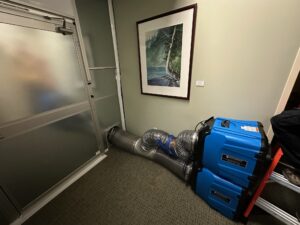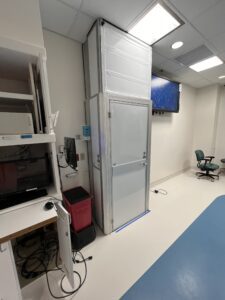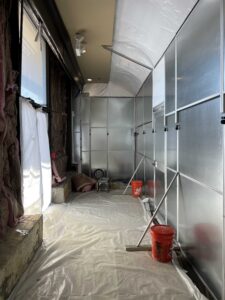2023 ICRA Training Guide
If you’ve been charged with carrying out a construction or renovation project in a healthcare facility, you’ll quickly learn the central role that ICRA plays in preventing the spread of infections. ICRA, which stands for Infection Control Risk Assessment, is a crucial framework for ensuring that every step of the project aligns with the stringent infection control measures necessary for safeguarding the well-being of patients, staff, and visitors within a healthcare environment.
As a contractor or facilities manager, your job is to ensure every healthcare project meets such measures, and that’s where ICRA training comes in. Given the wide array of courses available, selecting a program can be a challenge. Our goal with this guide is to help streamline the process by offering some insight into what you can expect from ICRA training along with providing an overview of some of the top programs.
What to Know About ICRA Training
What Does ICRA Training Cover?
The main objective of ICRA is to protect medical workers, patients, and visitors from healthcare- associated infections (HAI) contracted while receiving (or being exposed to) medical treatment. HAIs can be caused by bacteria, viruses, fungi, and other contaminants. These illnesses are especially common in settings like hospitals, urgent clinics, and long-term care centers, where patients often come into close contact with one another.
According to a recent estimate from the World Health Organization, around 7–15 out of every 100 patients will contract an HAI while in the hospital, and one in 10 of those infections will be fatal. These statistics reinforce why infection control measures are vital in all healthcare-related activities. Construction projects are no exception.
Here’s what you can expect to learn from a typical ICRA training in order to maintain the safest environment possible:
- Vulnerable populations: The specific needs of vulnerable patients, such as those who are immunocompromised or have chronic health issues.
- Hazard identification: Potential sources of infection within a healthcare facility in order to mitigate the level of exposure. This can include the layout design, ventilation systems, sanitation or hygiene practices, and other risk factors.
- Control measures: Best practices for containing the spread of infection. This can include protective gear and equipment, isolation precautions, hand washing, vaccination programs, and environmental cleaning or disinfection protocols.
- Surveillance monitoring: How to track the spread of infections, notice the signs of a potential outbreak, and report unusual symptoms or incidents.
- Regulations or guidelines: Relevant local, state, and national regulations for infection control and how to stay informed about new research, ordinances, technologies, or best practices in the field of infection control and healthcare safety.
- Crisis management: Infectious disease outbreaks or unexpected events that can pose a threat to infection control and ICRA compliance.
- ICRA-compliant barriers: How to utilize ICRA barriers and negative air pressure within the construction area to minimize the spread of any harmful contaminants.
- Practical exercises (on-site trainings only): Hands-on simulations to learn and reinforce the correct ICRA protocols.
Who Should Participate in ICRA Training?
In most healthcare facility construction and renovation projects, there’s usually a multidisciplinary team of professionals tasked with maintaining ICRA protocols. These individuals may include contractors, IT specialists, healthcare administrators, clinicians, facility and equipment managers, infectious disease experts, patient advocates, or occupational health workers.
Anyone who fits these criteria above will benefit from ICRA training. However, ICRA training is especially valuable for contractors given their unique responsibilities in managing risks and ensuring safety on construction sites within healthcare facilities. Here are some of the skills contractors in particular can expect to learn as part of an ICRA training course:
- Evaluating construction locations and operations for potential risks
- Analyzing airflow patterns and filtration quality
- Determining how best to navigate patient care areas
- Selecting equipment to maintain negative air pressure
- Implementing ICRA barriers to protect facility occupants
| Read Next: Do you have an ICRA construction project coming up? Check out our ICRA Construction Checklist for Contractors and Facilities |
Does ICRA Training Expire?
Unlike a certification or license, ICRA training doesn’t have an expiration date. However, specific program certificates may only be valid for a limited period of time. This is because, as infection control is a constantly evolving field, the information, techniques, and regulations you’ll learn can become obsolete over time as new updates and advancements emerge.
In order to stay current, it’s best to renew your ICRA training credentials after about three years, although the exact time frame may differ from program to program.
Below are just a few reasons to invest in ICRA training on a continual basis:
- Keep up with new updates: Infection control practices are always subject to change. As new diseases emerge or the latest research is unveiled, it’s critical to educate construction and facilities management teams on the latest strategies for maintaining safe environments.
- Stay adaptable in diverse settings: Medical institutions may have their own infrastructures or protocols for infection control, so you’ll want to be familiar with a wide range of techniques that can be adapted and integrated with the specific systems of the various healthcare facilities you’re contracted with.
- Increase proficiency: It’s always a smart idea to strengthen your current infection control knowledge and skills, whether that means enrolling in an ICRA live workshop, conference, or online refresher course.
ICRA Training Programs to Consider
We’ve curated a selection of some of the most reputable ICRA training programs that offer the essential knowledge and skills needed to navigate Infection Control Risk Assessments in healthcare environments. While this list is by no means comprehensive, it’s a great place to start.
American Society for Healthcare Engineering
- Where It’s Offered: ASHE hosts ICRA training courses both in person and online.
- What It Covers: You’ll learn to create and maintain work areas that comply with all the latest infection control guidelines, as well as how to conduct a thorough ICRA evaluation for each healthcare construction project you undertake.
- Length of Time: You can choose between a one- or two-day course option.
- How Much It Costs: $545 (one day), $895 (two days)
- Why We Like This Program: ASHE has an extensive library of ICRA training resources for a diverse range of professionals, such as healthcare facility managers, architects, designers, contractors, engineers, and infection control specialists. No matter your role in the project, there’s a unique training module for you.
United Brotherhood of Carpenters
- Where It’s Offered: UBC hosts ICRA training courses in person at over 240 locations across the United States and Canada.
- What It Covers: You’ll learn how to contain pathogens within the construction area, ensure that optimal safety measures are in place, and perform the job efficiently without causing any disruptions to normal healthcare activities.
- Length of Time: You can choose between a 24-hours flagship intensive course or an 8-hour ICRA awareness course option.
- How Much It Costs: All UBC ICRA training is free of charge.
- Why We Like This Program: UBC offers a blend of classroom and experiential learning, both of which take place in realistic simulated environments. The (free) price tag of this valuable training is also attractive to many students.
Infection Control University
- Where It’s Offered: ICU hosts a six-part ICRA training course and certification online.
- What It Covers: You’ll learn how to practice safe and effective ICRA measures for each project. This includes many precautions such as worker routing, construction barriers, negative air pressure, and other healthcare setting considerations.
- Length of Time: The learning modules for this course are self-paced, so you can move through them as fast or slowly as you choose.
- How Much It Costs: $65 annually (plus a $100 one-time setup fee)
- Why We Like This Program: ICU offers a flexible, self-paced learning experience. The certification, valid for three years, provides professionals with a credible credential that showcases their expertise and commitment to infection control.
Construction Infection Control Training Institute
- Where It’s Offered: CICTI hosts an ICRA training course both in person and online.
- What It Covers: You’ll learn what infection control is, why this matters for construction projects, and how to mitigate operational healthcare risks through the use of resource allocation, design initiatives, maintenance strategies, and more.
- Length of Time: This course will take place over 8 hours, either live-streamed on Zoom or on site at the CITI training facility in North Carolina.
- How Much It Costs: $510 (includes a 2-year certification)
- Why We Like this Program: CICTI teaches students how to think about infection control as more than just a theoretical concept by introducing them to various real-world scenarios and evaluations, which help them gain a deep understanding of how to apply infection control concepts effectively.
Make Sure Your Next Project Is ICRA-Compliant
Understanding and implementing ICRA in healthcare facility projects is vital for safeguarding the health of patients, staff, and visitors. The evolving nature of infection control practices underscores the need for continual education, making regular ICRA training renewal essential.
Choosing the right ICRA training program is a critical step in ensuring that healthcare projects adhere to the highest infection control standards. Reputable ICRA training programs, such as those listed above, provide comprehensive education that empowers professionals to implement effective measures throughout all project phases.
Here at Temporary Wall Systems, we provide ICRA-compliant containment solutions that are safe, clean, and environmentally responsible — but still durable enough to sustain rigorous daily operations. We know an active construction or renovation site’s needs, specifications, and challenges firsthand. That’s why we offer the highest quality walls on the market.
TWS makes it easy for your whole team at each step in the office renovation process. From installation to removal for both large and small projects, our experts deliver full-service rental solutions to accommodate your unique needs and objectives: Rented. Delivered. Installed. Removed. Contact us for an estimate today.


